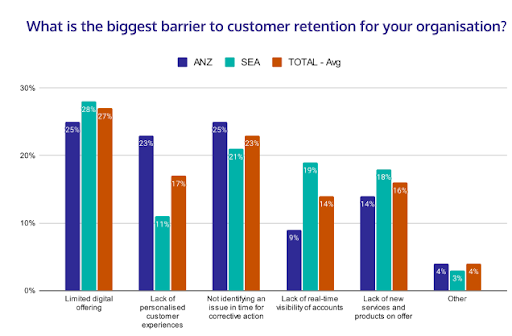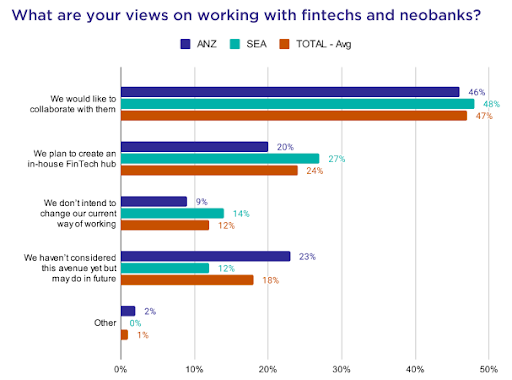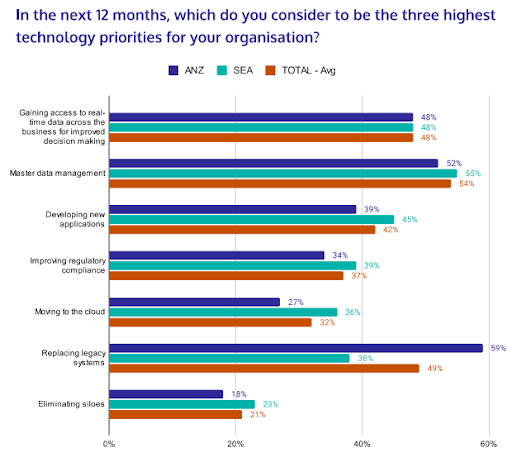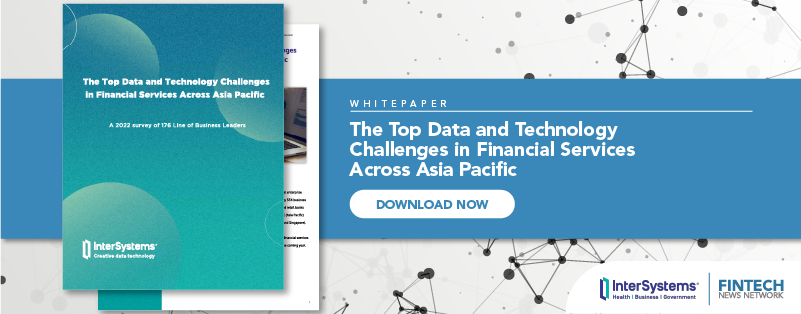
InterSystems Survey Highlights Data and Tech Obstacles for Financial Services in Asia Pacific
by Fintech News Philippines March 8, 2023Financial services firms across the Asia Pacific are facing an ever-increasing array of data and technology challenges stemming from both the growth in the volume of customer and business data being generated and the proliferation of data siloes across different applications and platforms.
This has led to an urgent need for financial organisations to access, manage, and leverage their data effectively to improve operational efficiency, enhance decision-making, and, ultimately, better serve their customers.
In a recent survey by InterSystems, a provider of data management solutions involving 176 leaders in the APAC region, several vital data and technology challenges were identified that are common to financial services firms in the region.
The study’s main goal was to determine the region’s most significant technology and data-related challenges faced by financial services firms and their critical data initiatives and priorities for the following year.
Data and technology challenges in financial services
Data is commonly fragmented across different systems, siloed within a company, saved in varying formats and structures, and labeled with disparate naming conventions and metadata.
Significant investments of time and money are necessary to make sense of this scattered data. Additionally, outdated, manual spreadsheets and dependence on IT for customized reports increase complexity and hinder an organization’s capability to access pertinent data instantly.
According to the survey, the most significant data challenges reported by respondents are the inability to report on all relevant data (36 percent), the inability to obtain data from all required sources (35 percent), and delayed access to data (34 percent).
Most of these challenges arise from excessively complex data infrastructures established using a disconnected array of technologies and applications. These infrastructures create silos that make it challenging to obtain information and insights promptly and in a manner that is easily interpretable and shareable.
Meanwhile, a majority (87 percent) of financial services organizations in the Asia-Pacific region encounter issues and worries in utilizing their data to inform decision-making, similar to the global percentage (86 percent).
The top data challenges faced by these organizations include the inability to report on all pertinent data (36 percent), difficulty obtaining data from all required sources (35 percent), and delayed access to data (34 percent).
Difficulties in monitoring and predicting customer interactions
As the amount of data increases, financial organisations face more significant challenges in monitoring and predicting customer interactions. This not only affects the overall customer experience but also presents challenges in terms of attracting, retaining, and expanding customer accounts.

The consequences of these delays are extensive, affecting the capacity of firms to obtain a comprehensive understanding of customers, as indicated by 41 percent of respondents. It is challenging to use data to make decisions, according to 39 percent of respondents, with this figure soaring to 68 percent in Malaysia.
In comparison, 35 percent of respondents express that they cannot make decisions based on real-time data, and thus, they are frequently forced to rely on assumptions, which may not always be accurate. This has significant implications for the precision of the information and the resulting decisions.
Exploring collaborative opportunities with fintech and neobanks
It is commonly believed that traditional banks are in direct competition with fintechs and neobanks, known for their agility and innovative use of technology, enabling them to offer competitive financial products and services to customers.
On the other hand, traditional banks have been known for their legacy systems and conservative approach to innovation.
However, many traditional banks are now partnering with fintechs and neobanks, recognising that they bring unique strengths and perspectives to the financial industry. These partnerships are helping to bridge the gap between traditional and digital banking, providing customers with the best of both worlds.
According to the survey, 47 percent of financial services firms have expressed interest in collaborating, in contrast to the public perception that traditional banks and fintechs are in direct competition.

The survey also reveals that more than half (60 percent) of the firms believe they are keeping pace with the competition. However, over a third (34 percent) of firms think they are ahead of the curve, with Hong Kong leading the way at 63 percent.
In anticipation of what lies ahead
Financial services organisations in the APAC region know what they need to prioritize in the upcoming 12 months. According to recent findings, over half (54 percent) of the firms have stated that their primary focus is to improve data management.
This indicates that companies in the region understand the significance of managing their data effectively to enhance their operations. Additionally, 49 percent of firms have made it a priority to replace outdated systems. This step is crucial for companies to remain competitive and meet the ever-evolving needs of the market.

Forty-eight percent of firms prioritize acquiring real-time data across their organization to strengthen their decision-making capabilities further. By achieving these objectives, companies can overcome the primary data challenges that the research uncovered.
These changes can enhance their capacity to serve their clients more effectively, streamline their internal processes, and improve their bottom line.
Leveraging data as a catalyst for growth and success
Data plays a crucial role in decision-making and operational efficiency in today’s business environment, and financial services firms are no exception. Implementing modern data management technologies and approaches is essential to achieve a real-time, consistent view of data from different sources.
This enables firms to integrate data from multiple sources and provide business leaders with a more complete and comprehensive view of the organisation, supported by more insightful analytics.
Modern data management technologies and approaches also help ensure data consistency and accuracy, which is particularly important for financial services firms that operate in a highly regulated environment.
Overall, the top data and technology challenges in financial services across the Asia Pacific are complex and multi-faceted, requiring financial organisations to adopt a holistic approach to data management and technology adoption.
By overcoming these challenges, financial services firms can unlock the full potential of their data and technology capabilities, driving operational efficiency, enhancing decision-making, and ultimately delivering better outcomes for their customers.
Data fabric architectural approach to simplify access to distributed data
The Data Fabric architectural approach is designed to simplify access to distributed data by creating a unified and integrated data fabric that provides a consistent and real-time view of the data from various sources.
One of the critical benefits of Data Fabric is its ability to enable real-time data access and analytics, which can provide business leaders with a more complete and comprehensive view of their organisation.
InterSystems’s Data Fabric solution is developed to provide financial services firms with a modern, scalable, and flexible data management platform that enables them to integrate, unify, and analyze their data from various sources.
Click here to learn more about the “The Top Data and Technology Challenges in Financial Services Across Asia Pacific” survey and to download the survey report.








